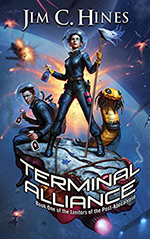
![]() illegible_scribble
illegible_scribble
1/28/2019
![]()
A couple of centuries ago, a plague destroyed the human race as it existed on Earth, turning them into mindless, carnivorous zombies and destroying their civilization. They – or at least a small number of them – were saved by one of the galaxy’s alien races, which cured the feral condition of a few thousand of them, and gave them back at least some semblance of sentience. Now grateful humans serve their alien saviors on their starships and space stations, as throwaway infantry soldiers and in menial maintenance and housekeeping roles.
This might sound like the synopsis for a grimdark science fiction series – and certainly the series has its grim moments – but it’s actually the premise for the humorous Janitors of the Post-Apocalypse series.
I’d like to head off the inevitable comparisons to Douglas Adams right here. Certainly this series has a bit of the whimsy and absurdism of which the Hitchhiker series is constructed – but it’s got plenty of grist for more serious thought, as well. And I have to say that while the humorous gimmick of Hitchhiker’s Guide to the Galaxy got old and tedious really, really fast for me, the first book in this series amused and amazed me, and left me wanting more.
When a bioweapon attack from another race of aliens wipes out the alien crew of their own spaceship, the team leader of the human janitorial staff must try to learn how to run the ship and save their benefactor race from further attack. But of course, nothing is as simple as it seems at first.
With their historical records pretty much eradicated in the fall of of their civilization, the uplifted humans have had to rely on what they are told about their species’ past by their alien rescuers – who, it turns out, are pretty damned unreliable narrators.
I adore the protagonist of this series, Marion “Mops” Adamopoulos: she’s practical and pragmatic and does not suffer from idealistic delusions, but she refuses to be defeated by her circumstances, and her pragmatism is leavened with humor and with hope.
This series manages to provoke thought about what it means to be human, what constitutes really living versus merely existing, the tragedy of failing to accept responsibility and make amends for mistakes, the danger of blaming – and punishing – entire races for the evil actions of only some of their members, whether the ends can sometimes justify the means, and the question of whether it’s ever really possible to accept and move on (and maybe even forgive) after being on the receiving end of a catastrophic, grievous wrong.
And in these novels, just as in real life, the beings on the receiving end of the wrongs can sometimes be the ones who are also committing transgressions. These are not stories of cut-and-dried heroes and villains, but of well-developed, complex and flawed beings with understandable motivations – wrapped up in a mystery and delivered with both pathos and levity.